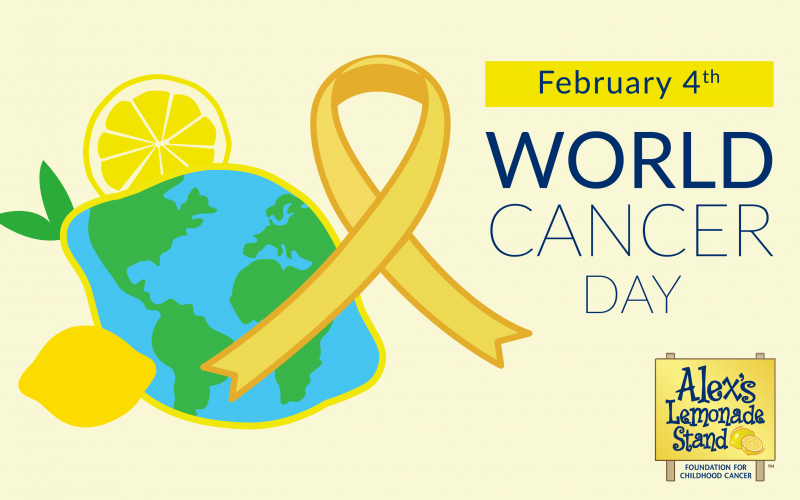
By: Trish Adkins
Every year, more than 300,000 new cases of cancer affect children under the age of 20 worldwide. This number is most likely underreported due to many cases that go undiagnosed and a lack of comprehensive childhood cancer registries. Making a difference for these kids requires collaboration across the spectrum of stakeholders. From supporters and research advocates to the scientists and physicians working in labs and clinics, finding cures and safer treatment for children takes all of us.
In the words of Alex’s Lemonade Stand Foundation (ALSF) Founder, Alex Scott, “I think if we all work together, we can do it.”
Here are five ways people all around the world are working together to help children with cancer:
1. Innovative Fundraising
Allen, dad to brain tumor survivor Liam, knew he needed to do something to help kids with cancer. Allen turned to his hobby, simulation racing games (Sim racing), and his friends from all over the world to raise more than $7,500 for ALSF through a livestream event — an ideal virtual platform for these days of social distancing.
From virtual lemonade stands to virtual 5Ks and stair climbs, other supporters found unique and innovative ways to raise both awareness and funds for childhood cancer research.
2. Open Science and Big Data Access
Data fuels science, but often data is difficult and time consuming to translate from project to project. To accelerate the pace of discovery, the Childhood Cancer Data Lab (CCDL), powered by ALSF, launched in 2017. The CCDL is working to harmonize data by putting it all in the same translatable format while also training researchers in data analysis.
The CCDL is also working with the team at the Center for Data-Driven Discovery in Biomedicine at Children’s Hospital of Philadelphia on the Open Pediatric Brain Tumor Atlas (OpenPBTA) project to analyze one of the largest collections of pediatric brain tumor data. OpenPBTA allows researchers to review each other's analyses in the open and offer feedback in real time, paving the way for faster discoveries.
3. Research Community Building
In 2020, when researchers were locked down at home with the rest of the world, ALSF launched The Virtual Childhood Cancer Lecture Series to provide educational and networking opportunities for cancer researchers and advocates. Presented by leaders in the field on topics ranging from genomics to survivorship challenges, these lectures provided unique ways to connect, collaborate and continue to build a childhood cancer knowledge base that can be applied to the lab, the clinic and in advocacy work.
4. Tissue Donation and Modeling Cancer
When Lilly faced surgery after relapsing, her family made the decision to donate extra tumor tissue to research instead of throwing it away. A donation of this type is a critical but often overlooked piece of childhood cancer research. As childhood cancer researchers work to find the drugs that could be cures, they are facing a critical shortage of tissue samples to test drugs for effectiveness and safety in the lab.
This shortage slows the pace of research — and ultimately delays cures for children. However, families and health care professionals are helping to accelerate research through tissue sample donation. Tissue samples like Lilly’s are sent to The Childhood Cancer Cell Repository, a lab funded by ALSF and used as a resource lab by the Children’s Oncology Group (COG). The Repository is located at Texas Tech University Health Sciences Center in Lubbock and directed by Dr. Patrick Reynolds. The Repository has cell lines and models developed from donated tissue from all around the world and in turn, provides these cell lines and models for free to any researcher.
5. Investing in International Collaborative Research
Two years ago, ALSF launched the Crazy 8 Initiative, an innovative grant program designed to create roadmaps toward cures for specific, hard-to-treat childhood cancers. The Initiative focuses on eight specific areas of research: embryonal brain cancers, high-grade gliomas, fusion-positive sarcomas, fusion-negative sarcomas, leukemias, neuroblastoma, big data and catalyzing clinical trials.
Since the launch, ALSF has worked to bring together the leading minds in childhood cancer research from around the world. From the first inaugural meeting in September 2018 to the 11 pilot grants in 2019 to this year’s upcoming grants awards totaling $18.5 million, the Crazy 8 is ensuring that breakthrough research is accelerated through collaboration with one aim in mind: curing childhood cancer.

